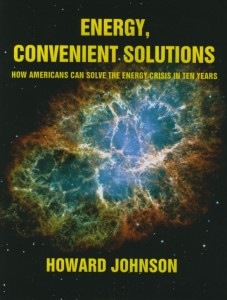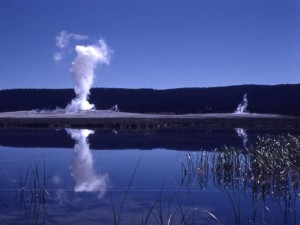I read an unusual book this week. “Energy, Convenient Solutions,” by Howard Johnson. The book was part Energy 101, part manifesto, part conspiracy theory. It began with a look at various forms of energy ranging from fossil-fuels to biofuels – to nuclear energy. From there, Johnson laid out his manifesto, per se, or his ideas on energy, our current state and what the future could or should look like. The end of the book reviewed factors that make it difficult to effect change as well as highlighted several “hate campaigns” that have been lobbied against big oil and nuclear energy.
 Johnson says the real purpose of the book is to present many different ideas about the generation, transport and use of energy. “The study of these ideas and the efforts to make them into realities can result in excellent and viable solutions in years, instead of decades. Creative solutions are sure to be found that require few and inexpensive infrastructure changes and by using both new and existing technologies.”
Johnson says the real purpose of the book is to present many different ideas about the generation, transport and use of energy. “The study of these ideas and the efforts to make them into realities can result in excellent and viable solutions in years, instead of decades. Creative solutions are sure to be found that require few and inexpensive infrastructure changes and by using both new and existing technologies.”
Now, before I continue, some of you will accuse me of being in the pockets of Big Oil. I’m not. I’m simply reviewing the author’s book and the thoughts contained therein. What makes the diversity of energy books so compelling is the fact that each author has his or her own ideas, predictions and solutions.
Speaking of predictions, Johnson outlines a few in his book. First, he notes that the largest energy growth sector is expected to be in electricity and the largest growth product will be nuclear energy followed by geothermal. He believes there will be a decline in coal-fired power plants unless carbon sequestration technologies come a reality, and also believes wind and solar energy will require long-term substantial subsidies to compete, and even so, may never be cost competitive. In addition, he predicts hydropower will stay fairly stagnant due to environmental concerns and finally believes electric vehicles will dominate and vehicles fueled by liquids (such as gas or biofuels) will be phased out. Needless to say, like so many others, Johnson does not believe first generation biodiesel or ethanol is a solution but does have hope for things such as algae-based biofuels.
After Johnson defines the various forms of energy, and then makes predictions about the success or failure of each, he presents his Optimal Energy Economy. “The Optimal Energy Economy consists of many viable systems to replace fossil fuels with renewable fuels that add no net carbon dioxide to the atmosphere. In the end, it will be cheaper, quicker, and far more practical than any other system,” explains Johnson.
 So what are the best solutions as part of his plan? Geothermal energy is at the top of his list. His ultimate energy combination though is geothermal energy, coupled with plug-in electric vehicles (PHEV) that are liquid fueled by advanced biodiesel. Short-term, other energy sources that will contribute include nuclear energy as well as domestically produced oil and natural gas.
So what are the best solutions as part of his plan? Geothermal energy is at the top of his list. His ultimate energy combination though is geothermal energy, coupled with plug-in electric vehicles (PHEV) that are liquid fueled by advanced biodiesel. Short-term, other energy sources that will contribute include nuclear energy as well as domestically produced oil and natural gas.
Johnson says that fossil-fuels will play a role in our energy paradigm for many years to come. He believes that we are missing important opportunities to develop our domestic oil industry by inhibiting offshore drilling and drilling in areas such as Alaska. He believes there is an orchestrated “Big Oil hate campaign” led by extreme environmentalists and this campaign is causing animosity toward oil companies as well as covering up the “gross failures of government efforts in virtually every government-fun project, especially energy.” He writes, “This and other similarly imaginary factors add to the price and subtract from the available supply of petroleum, in addition to the real problem of diminishing oil reserves.”
While this book provides an interesting accumulation of information, ideas and solutions, it doesn’t deliver in the area of a well-laid out energy plan for the future. So if this is what you are looking for, I would pull a different book off the shelf. But if you’re open to random predictions and theories interwoven with the energy sources Johnson believes will prevail, then this book may be for you.

